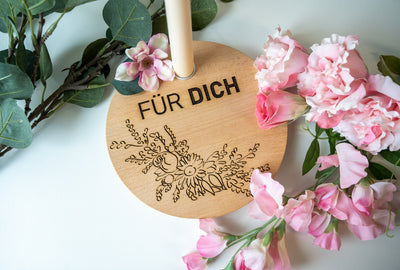If you want to plan a funeral for deceased loved ones or yourself in advance, comprehensive preparations are essential. Because a wide variety of options are available to you and quick burials are required after deaths, you should carefully organize all the details using the following tips for an individual funeral service .
Preparation for funeral planning with legal and financial aspects
When and how you need to start planning a funeral depends on the location and your personal situation. If you want to eliminate any residual risk and determine all the procedures for your own funeral yourself, you can't start planning your funeral early enough, regardless of your age or state of health.
However, if a relative died without making their own arrangements, the surviving relatives should plan the funeral within a few days.. In every German federal state, there is a relatively short maximum period after which the burial must be carried out. To begin planning the funeral, it makes sense to contact the funeral home directly and clarify all specific costs and options.
Additionally, the following legal and financial aspects are worth considering while planning a funeral:
- Every German federal state has individual burial laws.
- The next of kin are generally responsible for arranging the funeral.
- Funeral costs are usually borne by the heirs.
Choice of burial type and burial site
Basically, the following funeral options are available to you in Germany if you want to plan a funeral :
- Burial with coffin in cemeteries
- Cremation with cremation in a crematorium
- Tree burial with urn on tree roots
- Burial at sea after previous cremation
If you choose the cemetery for your own burial, you should keep the needs of your loved ones in mind. Ideally, the survivors live close to the final resting place. If you want to plan a funeral and are looking for a crematorium, you shouldn't ignore the transport costs when looking at cheap cremation costs in a far away fire hall.
Funeral service and ceremony: plan the funeral and arrange it appropriately
As soon as you plan a funeral and want to arrange the funeral service and ceremonies appropriately, you have to balance the wishes of the deceased and the needs of the surviving family. The following program design suggestions may be helpful:
- Favourite songs of the deceased as a replacement or supplement for religious music
- Close companions with anecdotes from their youth as speakers
- Special rituals with mourning candles, flying balloons or photos on a memorial wall
You can also make the ceremony more unique with a personalized funeral decoration, for example with the Mr Beam laser cutter. More and more undertakers are turning to laser machines to expand their services. The laser applications are very diverse in order to create an appropriate mourning decoration.
Design of the program and invitation
When planning the program, you must not forget the time if, for example, you want to plan a short funeral because of the weather or children present. When creating invitations for guests, this information is essential:
- Short introduction
- Date, time and location of the funeral service
- Name of the deceased
- Date of death and birth
Flower arrangements and decoration: recommendations for the arrangements

When it comes to flower arrangements and decorations, there are several recommendations you need to follow when planning a funeral. Coffin decorations or urn hoods are the centrepiece of mourning decorations and can use flowers to represent religious symbols and an expression of affection. Flower arrangements in the shape of a heart, for example, are suitable for this. In addition, these variants of floral decorations are often recommended:
- Funeral wreath with a final message to the deceased or a religious saying as an inscription
- Funeral arrangements as a cross, heart or pillow
- Funeral bouquet for the hands of relatives or as a decoration in front of the grave

While you should usually choose dark colours for clothing at a funeral, lighter colours make sense when matching the floral decorations to the significance of the occasion. In this way you express comfort, hope and confidence. Selected funeral flowers should match the relationship between you and the deceased. If you want to plan your own funeral in advance, you can convey personal feelings to your relatives. In many cases, you can express appropriate feelings of mourning with the following flowers:
- Red roses: deep affection and love between life partners
- white roses: loyalty and love within the family
- Forget-me-not: reminder of friends or colleagues
- Cloves : Loyalty to like-minded people
- Gerbera: Intense and powerful friendship
Planning funeral costs and budgeting
When budgeting for funeral costs, everyone involved must examine their individual financial options together. If you want to plan your own funeral early or are the only close relative of a deceased person, you can decide on the budget on your own without considering other people. For example, as soon as your siblings or children contribute to the funeral costs, no one should be overwhelmed with appropriate budgeting in the event of a bereavement. Ideally, the family members discuss in detail who can and wants to contribute what amounts.
Under certain conditions, the social welfare office provides financial support or help with paying funeral costs. In principle, reimbursement via social assistance is conceivable in these cases:
- Death benefit or inheritance does not cover funeral costs
- Deceased person has no heirs
- Heir was rejected
- Funeral costs are unreasonable for heirs
If the social welfare office confirms reimbursement of costs, only necessary expenses are covered. In addition to the general preparations and processes, this includes, among other things, simple decorations and initial planting. You only have a chance of having the costs covered for an additional funeral service, obituaries or mourning clothing through foundations.
Legal and administrative steps: formalities and necessary documents
Immediately after a death, a doctor issues a death certificate. To subsequently apply for a death certificate, you as a relative visit the registry office or instruct the funeral home to plan the funeral. The setting of a notary appointment for the estate settlement and the issuance of a certificate of inheritance often only takes place after the burial. If you have found a handwritten will and the last will is not yet known to a notary, you must immediately submit this document to the responsible probate court without delay.
The following documents and authorizations are important for various legal and administrative steps after a death:
- Identity card, birth certificate and marriage certificate of the deceased
- possibly divorce decree or death certificate of the previously deceased spouse
- Death certificate
- Death certificate as proof for insurance companies and other contractual partners of the deceased
- Certificate of inheritance or notarial will as a prerequisite for approved disposal of inheritance
Plan conclusion and follow-up after the funeral
If you want to plan the conclusion and follow-up after a funeral, it is important to first pay the bills for funeral costs. Ideally, you will have clarified necessary payments with other relatives at an early stage. If the deceased's account balance is sufficient to pay the funeral costs, banks usually allow a transfer without a certificate of inheritance. Otherwise, the question of costs must be clarified individually, as long as everything has not already been taken care of, for example with a funeral order, a pension contract or funeral insurance.
If you would like to plan the follow-up steps together with the funeral early on, you can prepare documents for the following formalities:
- Possible application for a survivor's pension for orphans or widowed spouses
- Termination or transfer of all contracts and insurance policies
- Termination of any rental agreement and evacuation of the flat
- final tax return for the year of death



